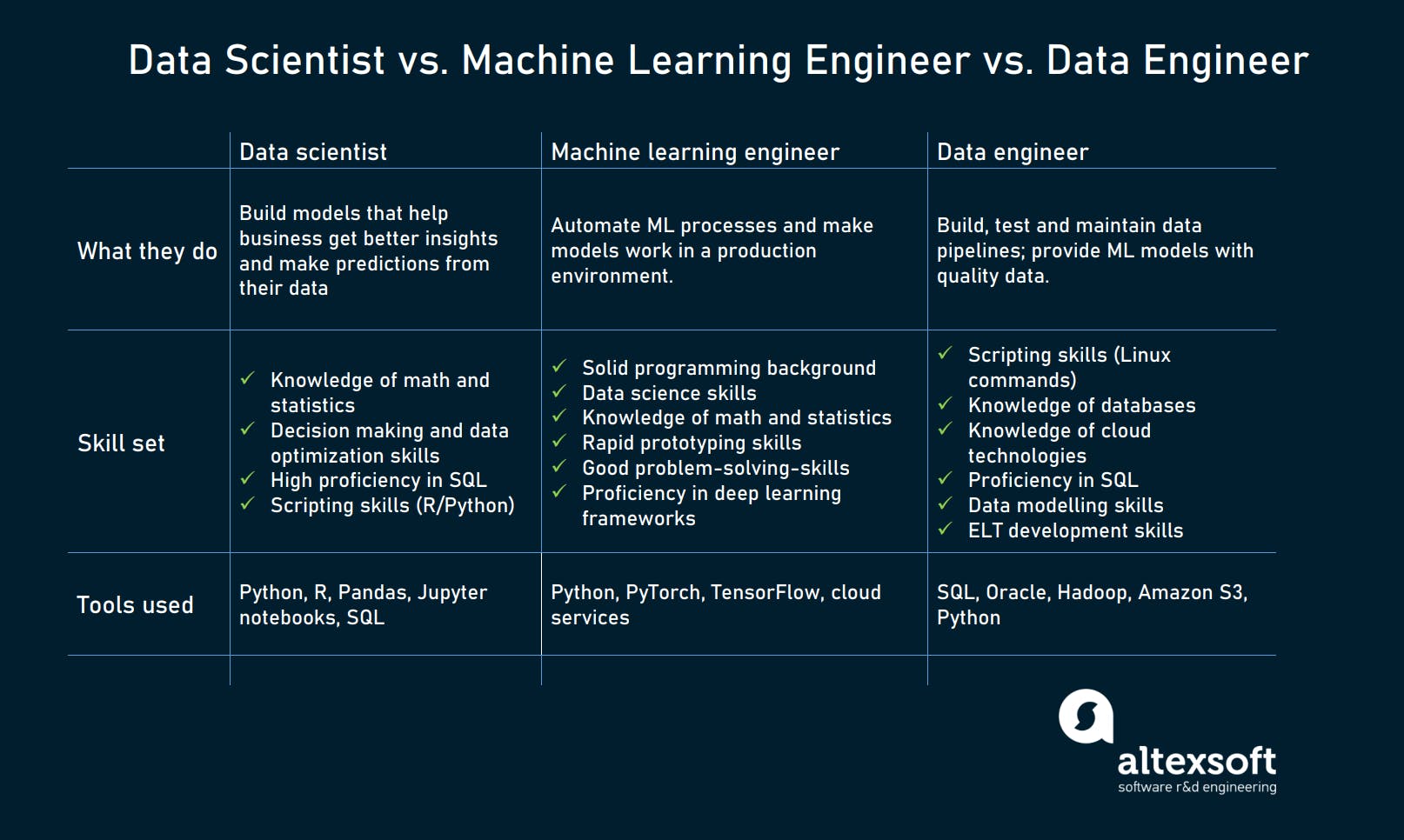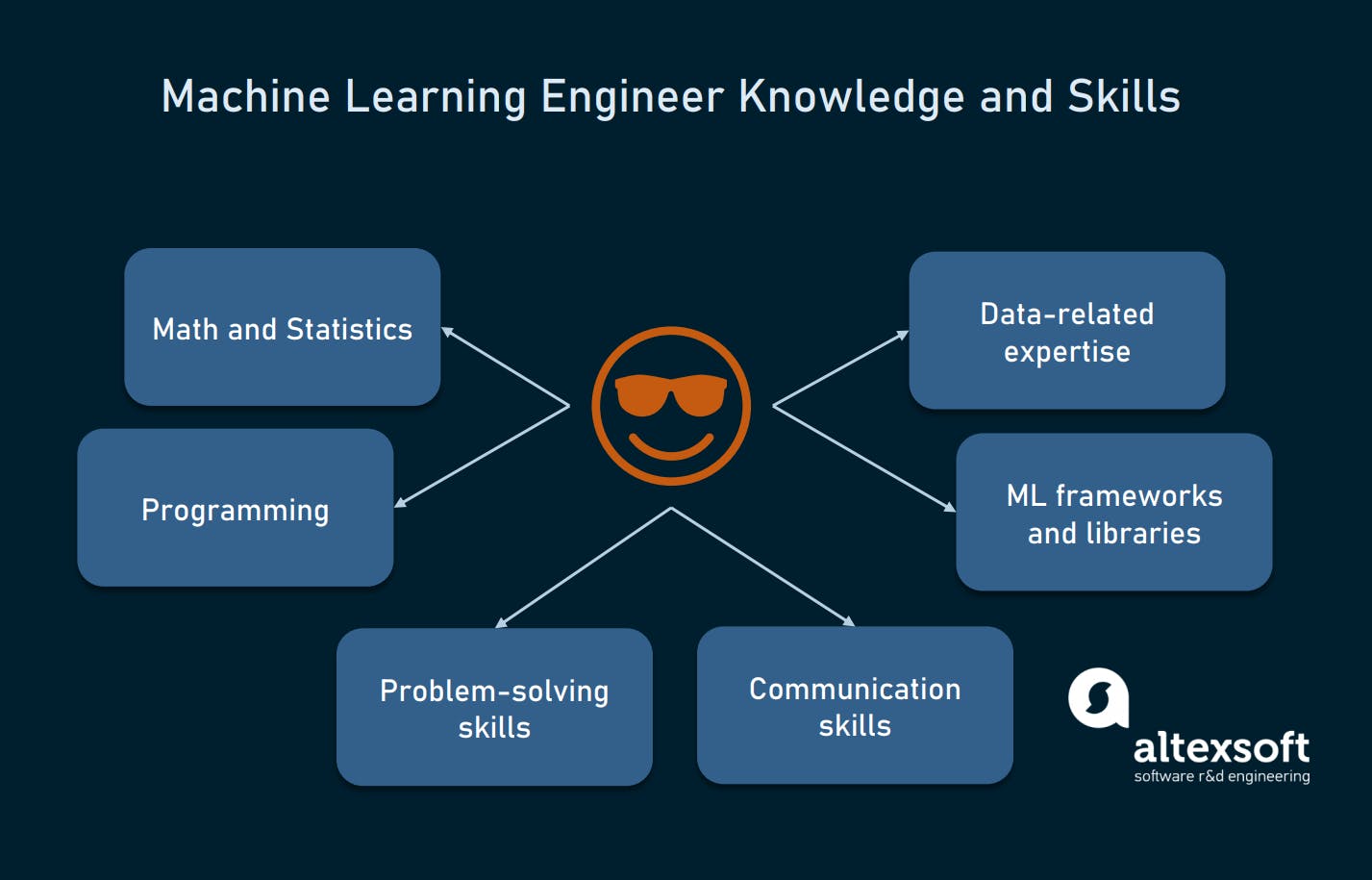Introduction
In the present age, where companies use artificial intelligence systems to understand customers’ preferences and improve user experience, the need for more machine learning engineers has been on the rise. With the combined knowledge of software engineering practices and designing machine learning algorithms, machine learning engineers help to serve artificial intelligence algorithms to customers.
This article gives a full explanation of the responsibilities of machine learning engineers and the important skill sets needed to be a successful machine learning engineer.
Who is a Machine Learning Engineer?
A machine learning engineer (ML Engineer) is a programmer with knowledge of software engineering practices who specializes in building, researching, designing, and deploying machine learning algorithms into production. ML Engineers design and build artificial intelligence systems that are capable of learning and making predictions on large datasets.
However, the objectives of an ML Engineer range from being able to build, adjust, deploy and maintain an artificial intelligence system before production and while in the production phase.
What is the work of an ML Engineer?
With the skills of a software engineer, a machine learning engineer deploys, maintains, and improves artificial intelligence systems while in production. They work closely with the data science team. They work with data pipelines provided by the data engineers while also helping them by pointing out important features to be added to improve the model’s accuracy and efficiency.
Although a machine learning engineer possesses the skills of a data scientist, the data scientist works majorly on carrying out research and experimenting with data and models. Their main tasks are to help with building models to get interesting business discoveries.
 Data Scientist vs. Machine Learning Engineer vs. Data Engineer. Source: AltexSoft
Data Scientist vs. Machine Learning Engineer vs. Data Engineer. Source: AltexSoft
Responsibilities of ML Engineer.
Although a machine learning engineer’s primary role is to build machine learning models and also make sure the models work correctly, the responsibilities of a machine learning engineer cut across all aspects of the data science team. The core responsibilities of a machine learning engineer can be categorized into five major phases. These responsibilities include:
planning, researching, and scoping of machine learning algorithms and schemes: These involve figuring out efficient methods for building a machine learning algorithm. Some of these steps involve the following:
- how the problem at hand can be solved using various schemes.
- discovering the amount of time needed to develop a well-efficient algorithm.
- focusing on how these algorithms are to be built.
experimenting and testing data and models: In this phase, the engineer is left with the task of finding out what data would work well to provide the necessary output for the task at hand. More interesting duties the machine learning engineer handles in this stage include:
- providing features that would help improve the accuracy of the model to data engineers.
- carry out tests on data pipelines provided.
developing, designing, and building ML algorithms: This phase is where the ML engineer gets more involved. With proper knowledge of software engineering practices, a machine learning engineer can build ML algorithms that are well-detailed, structured, and ready for deployment. The task at this stage include,
- writing a clean and well-structured algorithm to be deployed,
- hyper-parameter tuning when necessary,
- evaluating test data after training models,
- carrying out integration tests before final deployment.
deploying artificial intelligence systems: After building a deployable model, an ML engineer needs to deliver the AI system to the customers flawlessly. The engineer is to come up with interesting ways to deploy the system and also depending on the client's choice of hosting environment, he is to deliver a system that works well and does the required task.
evaluating and maintaining: While the artificial intelligence system is in production, the engineer must carry out a test on the data being fed into it and also evaluate how well the system works. The job of the ML engineer during this period is to maintain and carry out checkups on the system. In the case of faults or errors, fix up the necessary problems and also add new features when needed.
Skill required of a Machine Learning Engineer.
As a Machine Learning engineer, it is important to exhibit a certain skill set to be able to work successfully well in an organization. With these skills, an ML engineer has an edge when it comes to getting a well-paying job and delivering top-notch products. Most of the skills mentioned below, require constant practice to attain perfection.
 Basic Skills of a Machine Learning Engineer. Source: AltexSoft
Basic Skills of a Machine Learning Engineer. Source: AltexSoft
Programming skills: For a machine learning engineer to succeed in the AI space, he/she must know a programming language. Python, Java, C++, and R are all languages used in Machine learning. A machine learning engineer must know at least one of these languages. Knowing beyond one of the languages is a plus for an ML engineer.
Also, software engineering skills are necessary and compulsory for a machine learning engineer to deliver a top-class product to the end users.
Data-driven skills: A machine learning engineer needs to develop a sense of how to manage, work and analyze data effectively to come to meaningful and commendable conclusions. An ML engineer must know how to use different database platforms to properly carry out analysis and also create data-driven solutions.
- Good communication skills: The ability to present and communicate ideas in a way people can understand easily makes an ML engineer stand out. Presenting well-detailed products to clients gives ML engineers an edge when it comes to getting jobs.
- Proficiency with ML frameworks: Machine Learning frameworks like Tensorflow, Pytorch, and Scikit - learn are needed to work comfortably with machine learning algorithms. Most models built by machine learning engineers require an understanding of one or two tools.
- Good problem-solving skills: As a Machine Learning Engineer, possessing the skill to break down problems and also come up with means of solving these problems is an important skill to gain. These skills help the machine learning engineer easily and quickly conclude how to solve problems using machine learning algorithms and good software engineering skills.
I think that data scientists develop some required skills for a Machine learning engineer to gain an edge when it comes to job opportunities and also increase their opportunities to get jobs across these three different fields.
Do you think a data scientist must gain the skills necessary for a machine learning engineer? Or do you think the roles of machine learning engineers go beyond the above-mentioned or some of the above-mentioned opinions do not cover the responsibilities and skills of ML engineers?
Feel free to give your opinions and critiques on this in the comment section.


